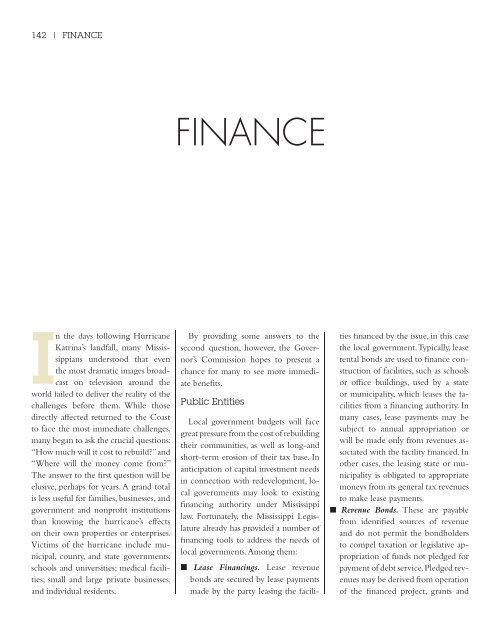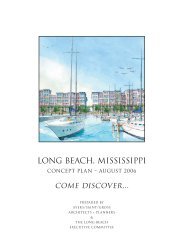Reports - Mississippi Renewal
Reports - Mississippi Renewal
Reports - Mississippi Renewal
- No tags were found...
You also want an ePaper? Increase the reach of your titles
YUMPU automatically turns print PDFs into web optimized ePapers that Google loves.
142 | FINANCEFINANCEIn the days following HurricaneKatrina’s landfall, many <strong>Mississippi</strong>ansunderstood that eventhe most dramatic images broadcaston television around theworld failed to deliver the reality of thechallenges before them. While thosedirectly affected returned to the Coastto face the most immediate challenges,many began to ask the crucial questions:“How much will it cost to rebuild?” and“Where will the money come from?”The answer to the first question will beelusive, perhaps for years. A grand totalis less useful for families, businesses, andgovernment and nonprofit institutionsthan knowing the hurricane’s effectson their own properties or enterprises.Victims of the hurricane include municipal,county, and state governments;schools and universities; medical facilities;small and large private businesses;and individual residents.By providing some answers to thesecond question, however, the Governor’sCommission hopes to present achance for many to see more immediatebenefits.Public EntitiesLocal government budgets will facegreat pressure from the cost of rebuildingtheir communities, as well as long-andshort-term erosion of their tax base. Inanticipation of capital investment needsin connection with redevelopment, localgovernments may look to existingfinancing authority under <strong>Mississippi</strong>law. Fortunately, the <strong>Mississippi</strong> Legislaturealready has provided a number offinancing tools to address the needs oflocal governments. Among them:■Lease Financings. Lease revenuebonds are secured by lease paymentsmade by the party leasing the facilitiesfinanced by the issue, in this casethe local government. Typically, leaserental bonds are used to finance constructionof facilities, such as schoolsor office buildings, used by a stateor municipality, which leases the facilitiesfrom a financing authority. Inmany cases, lease payments may besubject to annual appropriation orwill be made only from revenues associatedwith the facility financed. Inother cases, the leasing state or municipalityis obligated to appropriatemoneys from its general tax revenuesto make lease payments.■ Revenue Bonds. These are payablefrom identified sources of revenueand do not permit the bondholdersto compel taxation or legislative appropriationof funds not pledged forpayment of debt service. Pledged revenuesmay be derived from operationof the financed project, grants and




